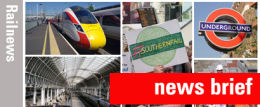Posted 19th August 2020 | 1 Comment
July RPI 1.6%, but implications for rail fares are less clear

THE Retail Price Index rose by 1.6 per cent in July, mainly because of higher prices for road fuel.
The July RPI has been used for many years to decide the New Year changes to rail fares, but this link has to be confirmed each year by ministers.
An announcement about any changes to fares in January is awaited from the Department for Transport.
The Rail Delivery Group has pointed out that the decision will be made by government. The RDG’s director of nations and regions Robert Nisbet said: ‘Decisions about regulated rail fares, including season tickets, are taken by governments who rightly make the choice about the balance between how much farepayers and taxpayers contribute. We know that the best way to support economic recovery now and keep fares down in the future is to get more people travelling by train.’
Meanwhile, the RMT union says if there is a rise then that will be proof that the government is ‘out of touch’.
The RMT’s senior assistant general secretary Mick Lynch said: ’The fact that this Government appears to be pushing ahead with yet another extortionate fare rise in January shows just how out of touch they are. This regressive fare increase hits the low paid hardest and will only serve to price more passenger off our railways and push even more people into their cars at a time when rail is in crisis.
’What we urgently need to see is bold and innovative leadership to give passengers what they want, a publicly owned railway with affordable and flexible ticketing that’s good value and suits their needs as part of the Covid-19 recovery.’
Reader Comments:
Views expressed in submitted comments are that of the author, and not necessarily shared by Railnews.

Melvyn, Canvey Island , Essex
Why should Rail users pay more because the cost of road fuel has supposedly risen. I say ‘ supposedly’ because if you check the prices outside garages the price charged is way below the prices being charged last year when fuel was approaching £2 a litre but during the recent shutdown fell to close to £1 a litre so it’s a rise based on short term recovery!
While road users continue to enjoy fuel duty freeze which has lasted a decade !
Railways already have a major problem of usage especially as most commuters no longer hold season tickets and thus don’t travel at weekends as they have to pay fares which were hidden in their season tickets.
It was just announced that Scotland has put off a decision on rail fares .